As a Navy veteran who has grown up in Chicago, I dreamed of the day that another African American man would become mayor after Mayor Harold Washington passed away from a heart attack during his second term in office. This new mayor would possess commonsense leadership and would tackle our myriad of municipal issues head-on and with a solid purpose and political will.
Mayor Brandon Johnson is not him.
In reaction to the killing of a 7-year-old boy, a true political leader would never sidestep responsibility and lay the blame for summer lawlessness at the feet of his predecessors. A true leader would have never done this because they would understand that the reason they took the job was to change the course of an organization and chart a new path, regardless of what type of environment they inherited.
They would understand that past performance was the reason they were chosen for the job in the first place because no one is ever called to fix what is not broken. A true leader who was not just into the job for the suits, entourage perks and constant smiles for the camera, would understand that there was real work that needed to be done and that worn-out quotes from others could carry them only so far.
Our current mayor’s actions remind me of what the great Black orator Frederick Douglass once said during one of his many speeches about slavery: “If there is no struggle, there is no progress. Those who profess to favor freedom and yet deprecate agitation are men who want crops without plowing the ground. They want rain without thunder and lightning. They want the ocean without the roar of its mighty waters.”
Johnson wants the accolades and prestige that his position brings, but without the true work and words needed to lead without relying on excuses and tired clichés. He takes the newfound wealth and security without accepting the fact that from the moment he was sworn in, this city and all of its problems became his, regardless of who in the past was in the fifth floor office that he now calls home.
The next time he has to speak on another senseless killing in the city that he was elected to lead, let’s hope he remembers this.
— Ephraim Lee, Chicago
Congress, pass Goldie’s Act
While it is gratifying to see Inotiv, via its Envigo subsidiaries, take some responsibility for its actions and face a hefty fine for the horrific cruelty thousands of beagles endured at its Virginia facility, more must be done to prevent dreadful outcomes from the U.S. Department of Agriculture’s continued lax enforcement. The USDA is responsible for protecting animals under the Animal Welfare Act, and despite documenting violations at Envigo’s now-shuttered breeding facility over several months, the agency took no action to stop the suffering.
This case is indicative of an ongoing pattern with the USDA: It rarely takes action, even when a facility has a history of violations. In 2021, the ASPCA helped rescue more than 500 dogs from horrific conditions at an Iowa puppy mill operated by Daniel Gingerich, a USDA-licensed dog breeder, who was cited for more than 100 violations. The USDA had the authority to confiscate the dogs and revoke Gingerich’s license, but it stood by while dogs like Goldie — a golden retriever who endured months of agony at Gingerich’s facility — suffered a preventable death on the agency’s watch.
The Envigo and Gingerich cases are just two of the most egregious examples of the USDA’s failures. According to an ASPCA report analyzing the USDA’s own data, federal inspectors documented more than 1,000 violations for commercial dog breeders and brokers, collectively called dealers, at more than 400 facilities in 2023, yet the agency took action against only four dog dealers.
Congress has an opportunity to address these enforcement failures by passing Goldie’s Act. This federal legislation was inspired by Goldie’s plight, and it would prevent thousands of other vulnerable dogs from meeting the same tragic fate. It would require the USDA to conduct more frequent and meaningful inspections, provide lifesaving intervention for suffering animals, issue penalties for violations, and communicate with local law enforcement to address cruelty and neglect. Goldie’s Act is championed by a bipartisan group of federal lawmakers, including Illinois U.S. Reps. Mike Quigley and Raja Krishnamoorthi.
The best way to honor Goldie and animals at countless other USDA-licensed facilities is to make sure no other animal endures the same terrible and unacceptable fate. We urge Congress to pass Goldie’s Act to ensure dogs in puppy mills get the protections they deserve.
— Matt Bershadker, president and CEO, American Society for the Prevention of Cruelty to Animals
Pony rides are inhumane
A heat wave such as the recent one can be taxing on many Chicagoans, but unlike most people who can find respite from the heat and humidity, animals who are not considered pets usually cannot. And nobody wants to walk around in circles repeatedly for long hours in the hot sun, especially while hooked up by their face.
On the weekend of July 12 to 14, the West Town Chicago Chamber of Commerce is offering pony rides as part of its Kid Fest at its street festival West Fest.
The Chicago Alliance for Animals (CAA) has urged West Town Chamber’s executives to cancel these pony rides, but we’ve been told to contact the Talcott Fine Arts and Museum Academy, an elementary school that is the benefactor and organizer.
There are numerous ways to raise money and entertain the public; however, animal exploitation should never be part of a humane society.
As an educational institution, Talcott should be encouraging students to be kind and compassionate, not promoting the use of animals as props or for rides.
To have “amusement” such as this, timid ponies, who are prey animals that spook easily, are often trained through intimidation tactics. They are forced to stand and walk in circles for long hours in the summer heat, surrounded by crowds of people and loud bands, and are forced to constantly travel. And after giving rides to children all day, the ponies have another long journey home.
It’s stressful, inhumane and wrong, and what it boils down to is that when animals are used for profit, their welfare is never a priority, and they often suffer needlessly.
The West Town Chamber of Commerce and Talcott Fine Arts and Museum Academy should take a cue from Chicago’s Puerto Rican Fest and Taste of Lincoln Avenue and cancel the pony rides and any upcoming petting zoos, as well as commit to not exploiting animals going forward.
— Jodie Wiederkehr, founder and executive director, Chicago Alliance for Animals, Chicago
CPR training is essential
I think letter writer Noah Roth’s suggestion (“Teach CPR in gym class,” June 21) that schools teach CPR to their students is a wonderful idea!
As a former volunteer firefighter and emergency medical technician, a CPR instructor and an emergency department registered nurse for 30 years, I have unfortunately seen countless people die due to a cardiac event when no intervention (CPR) was done in that first four to six minutes. So many people suffering cardiac arrest could potentially be saved if more of us received training in CPR.
Kudos to Noah for the suggestion. I advise him to take this up with his school board.
— Patricia Bonk, Midlothian
Teach bicycle safety as well
I read the letter written by Noah Roth, age 11, who advocates for CPR to be taught in physical education class in school. That’s an excellent idea, and another class to perfectly complement the CPR class would be a bicycle safety class.
That’s another lesson that will most definitely save lives, and combining the two would make an even bigger impact.
— Brian Collins, Orland Park
Note to readers: If you are a cyclist, we would appreciate knowing your thoughts on the city’s bike infrastructure and your experiences using a bicycle for transportation, whether positive or negative. Send us a letter of no more than 400 words to letters@chicagotribune.com. Provide your full name and your contact information including city.
Submit a letter, of no more than 400 words, to the editor here or email letters@chicagotribune.com.




